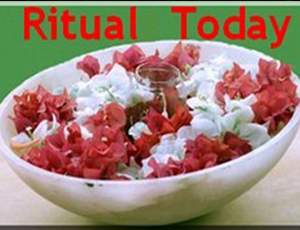
International conference "Ritual today" organised by Institute for the Study of Religions of Jagiellonian University (25-27 June 2009).
Programme:
Thursday, 25th June
10:30 (Aula) Opening and Welcome:
Prof. Maria Flis (Dean of the Philosophical Faculty, Jagiellonian University)
10:45-12:15 (Aula) Plenary Session - Chair: Halina Grzymała-Moszczyńska
Prof. Ralph W. Hood, Jr. (The University of Tennessee at Chattanooga, USA)
Serpent Handling: A Christian Ritual that Maims and Kills
Unique to the Appalachian Mountain region of the Southeastern United States are Christians who believe that Mark 16: 17-18 makes it imperative for believers to handle serpents. Once associated with the emerging Pentecostal denominations, such as the Church of God, the institutionalization of the practice of handling deadly serpents initially facilitated church growth as lay believers demonstrated the power to handle serpent without harm. However, as handling became institutionalized as a major ritual, believers began to get bit, maimed, and died. The major Pentecostal denominations then backed away from the practice, while what I term the renegade Churches of God continue to this day the ritual of serpent handling. The complex interaction between belief and practice will be explored based upon a study of contemporary handlers and detailed participant observation of a tradition in which the central ritual maims and kills but also provides a meaningful frame within which death is transcended for those who believe God has granted them "victory" over the serpent.
12:15-12:45 Coffee break
12:45-14:00 (Aula) Plenary Session - Chair: Stanisław Wargacki
Prof. Andrzej Szyjewski (Jagiellonian University): Myth, ritual or history?
Private investigation on kauaua post and Tjilpa subclan sudden extinction
Long lasting argument between coryphées of comparative religion, Mircea Eliade and Jonathan Z. Smith, both trying to explain mysterious death of an Australian Aboriginal subclan, has been recently re-examined by Sam Gill in his book called "Storytracking". Gill has proved that both scholars were wrong, Eliade in stating that the story of Tjilpa kauaua post collapse was an account of real event and a proof that human cannot stand the lack of sacred space center, and Smith supposing that the myth of Tjilpa wandering may be classified as a pattern of establishing whole clan environment as meaningful e. g. sacred, and wandering tribes do not have a notion of sacred center. Despite his thorough and painstakingly detailed examination, Gill overlooked some elements important for the meaning of the story. Tjilpa story should be understood in the light of rituals of achieving and losing power, that are more or less common in Aboriginal Australia and are up till now the source of identification with land by the agency of sexual symbolism.
14:00-15:30 Lunch break
15:30-17:15 (Sala Senacka) Session I: Religious ritual – tradition and change
Chair: Dominika Motak
Peter McCaffery, The Ambiguities of Silent Ritual
Michał Kocikowski, The Way of the Precious Blood – Ritual of Purification and Liberation
Gianni F. Trapletti, The Ceremonies of the Church of Scientology: Between Traditional Rituals and Modern Cultural Practices
18:00 Get-together at the Święta Krowa pub
Friday, 26th June
9:30-11:15 (Sala Senacka) Session II: Theoretical perspectives on ritual I
Chair: Peter McCaffery
Agnieszka Leśny, The Signature or the Utterance: What Constitutes an Oath in Modern Times?
Anna Niedźwiedź, "Ritualization" of Space Stanisław Wargacki, The Role of Collective Emotions in Ritual
11:15-11:45 Coffee break
11:45-13:30 (Sala Senacka) Session III: Death rituals and funeral practices
Chair: Andrzej Szyjewski
Margita Jágerová, Rituals in the Process of Changes: Some Aspects of Contemporary Burial Rites in Slovakia
Anna Kubiak, The Quest for New Funerals
Małgorzata Zawiła, Old and New Elements in Death Rituals in Poland
13:30-15:00 Lunch break
15:00-16:45 (Sala Senacka) Session IV: Ritual and personal identity
Chair: Anna Niedźwiedź
Małgorzata Sacha, Ritualizing, Negotiating Agency: "Indian Woman" Past and Present
Maria Sroczyńska, Passage Rituals in the Eyes of Polish Youth on the Threshold of Adoulthood
Marko Veisson, "Colonizing" the Ritual: Estonian Song Celebrations in the Service of Nationalism, Soviet Socialism and Punk
16:45-17:15 Coffee break
17:15-19:00 (Sala Senacka) Session V: Modern rituals - "invented traditions"?
Chair: Anna Kubiak
Katarzyna Bajka, Halloween – the Evolution of a Harvest Fare
Scott Simpson, Turn-Taking Rules and Deliberative Functions in Polish Neo-Pagan Drinking Rites
Maciej Witulski, Rituals in Wicca
Saturday, 27th June
9:30-11:15 (Sala Senacka) Session VI: Ritual and social identity
Chair: Małgorzata Zawiła
Halina Grzymała-Moszczyńska, Religious Rituals in Life of Polish Migrants–Comparative Analysis Agnieszka Trąbka, The Role of Ritual in Constructing Social Identity
Anna Kapusta, Agnieszka Późniak, "The Hell Exists!" Ritual Script as a Social Practice of Ritualization
11:15-11:45 Coffee break
11:45-13:30 (Sala Senacka) Session VII: Theoretical perspectives on ritual II
Chair: Marta Höffner
Jakub Bohuszewicz, Biological Landscape of Ritual
Mateusz Dąsal, Contemporary Secular Rituals in the Biogenetic Structuralism Perspective
Paweł M. Socha, Toward a Comprehensive Theory of Spirituality: Ritual As the Behavioral Side of Sanctification
13:30-15:00 Lunch break
15:00-17:00 (Sala Senacka) Session VIII: Rituals in the process of change
Chair: Scott Simpson
Karolina Dudek, Wedding Films: Media and Rituals
Joanna Grzymała-Moszczyńska, Gong Music Concerts as a Contemporary Ritual
Agata Biały, Piotr Czarnecki, Karina Jarzyńska, Agata Koim, Magdalena Łyko, Martyna Wnęk, Passion Play in Kalwaria Zebrzydowska: Between Religious Ritual and Social Event

